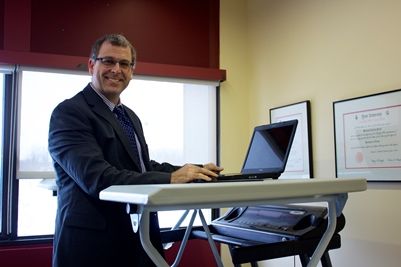
Professor Michael Pratt, who joined Queen’s in 2003 as a Law professor cross-appointed to Philosophy, began a two-and-a-half-year appointment as Law’s Associate Dean (Graduate Studies and Research) on Jan. 1. A graduate of the University of Toronto (BSc, LLM), Osgoode Hall Law School (LLB) and the University of Sydney (PhD, Philosophy), he has taught a range of private law subjects, including Torts, Contracts, Remedies and Advanced Contract Law. His research draws on philosophy to understand the law, and he has been particularly interested in understanding the role of intention and consent in the creation and extinction of legal and moral obligations. He has written widely on the philosophical foundations of voluntary obligations, as well as on the law of damages.
Queen’s Law Reports met with Associate Dean Pratt to talk about his plans for each of his Law portfolios.
QLR: As Associate Dean, what will you do first?
MP: In the short term, my goal is to learn – learn the practices, procedures, and processes that already serve to make research and graduate studies such successful aspects of our law school. My predecessor, Sharry Aiken, served Queen’s Law tirelessly in this role and has been very generous in supporting me as I learn the ropes.
QLR: Which aspects of your research role do you look forward to most?
MP: Queen’s Law boasts some of the very best scholars in their fields in Canada, and in some cases in the world. I am tremendously proud of the scholarly calibre of our faculty, and it will be really fun to have this official platform from which to sing its praises – both to the wider scholarly community and to the powers-that-be here at Queen’s.
On a more personal level, I’m looking forward to learning more about what my colleagues are writing, to helping junior colleagues find their feet in this fabulous profession, and to advocating for awards, prizes and grants for the school’s very accomplished scholars.
QLR: And what do you look forward to in your graduate studies role?
MP: I am very excited about that, too. It’s a delight to work with young people whose passion for research is robust enough to motivate them to put off earning a salary in order to pursue advanced studies, often in a foreign land far from home, sometimes for several years. There is a relationship between the reputation of a law school and the reputation of its graduate program, with the influence running in both directions. Graduate students form part of the scholarly community at Queen’s Law. I will encourage them to see themselves that way, and I am excited about developing ways to further integrate them into the law school’s intellectual life.
QLR: What are your top priorities for research at the Faculty?
MP: I see it as part of my job to stand guard, as it were, to make sure that the abundance of scholarly excellence we have at Queen’s Law is allowed to flourish. Producing high-calibre scholarship is very time-consuming, and it is increasingly international, collaborative, and interdisciplinary. I will be advocating on behalf of my colleagues for the funds – and the freedom – necessary to permit them to thrive as scholars. I am fortunate to be working with a dean who is exceptionally supportive of research, but Dean Flanagan has to serve many stakeholders with a variety of interests. My role is to promote the interests of our scholars, to the Dean and to the University.
I’m also committed to providing practical support for our researchers and to promoting the research culture at Queen’s Law. My job will include assisting with grant applications, conference and publishing initiatives, the creation of research centres and research groups, and developing Law’s links with other departments in the University. We have a flourishing visitors program, and in concert with that I want to develop a post-doctoral fellow program, bringing in talented scholars for sustained periods. Other priorities are to nurture research links with the judiciary, investigate the possibility of a judge-in-residence program, and help our JD students – and also practitioners – better appreciate the importance of research and scholarship to the development of law and to a well-balanced legal education.
QLR: What are your goals for LLM and PhD studies?
MP: I am committed to recruiting some of the very best students from around the world to come to Queen’s to pursue graduate work in law. We have extraordinary scholars here, and I want to attract extraordinary graduate students to work with them. The relatively small size of Law’s graduate program is one of its great strengths. It allows us to be selective. It also allows for a wonderful level of collegiality and cohesion among our graduate students, which is a very “Queen’s” thing.
I also want to explore opportunities for creating new and distinctive graduate programs at the Faculty. I’m investigating ways in which Law might collaborate with other departments to design and offer a jointly-run cross-disciplinary PhD program. Our remarkable strength in legal theory and legal and political philosophy would, for example, situate us very well to offer a collaborative PhD in Law and Philosophy, perhaps with participation by the Department of Politics as well, which would be nothing short of world-class.
I’m very eager to explore ways in which to integrate graduate students more fully into the research and intellectual life of the law school. This may involve a modest cultural shift, which I hope to facilitate by bringing faculty members and graduate students together more frequently in seminars, workshops, and conferences – some of which will be designed with this goal in mind. I want law students to leave Queen’s not just with a mastery of their field of study, but moreover with a sense of what it is like to work as part of a community of scholars.
-----------------------------------------------------------
Although his plans include more travel for research and recruiting, Michael Pratt, his two children and their pet Labradoodle continue to make Kingston their home.